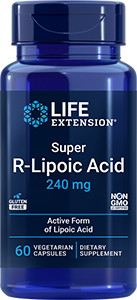
Newsletter
Newsletter
Daily multivitamin linked to better cognitive function

Older men and women who took a daily multivitamin/mineral experienced improved overall cognition, memory and other mental functions compared with a placebo. At the end of a 3-year clinical trial, participants who took a multivitamin slowed their cognitive aging by the equivalent of approximately 1.8 years.
Participants who took the multivitamin also experienced improved episodic memory and executive function (which describes cognitive abilities needed for goal-directed behavior). The improvement appeared to be greater for people with a history of cardiovascular disease.
These findings were published on September 14, 2022, in Alzheimer’s & Dementia®, the journal of the Alzheimer’s Association.1 “This is the first positive, large-scale, long-term study to show that multivitamin-mineral [intake] for older adults may slow cognitive aging,” Maria C. Carrillo, PhD, chief science officer of the Alzheimer’s Association stated. “We envision a future where there are multiple treatments and risk reduction strategies available that address cognitive aging and dementia in multiple ways — like heart disease and cancer — and that can be combined into powerful combination therapies . . . in conjunction with brain-healthy guidelines for lifestyle factors like diet and physical activity.”
“There’s an urgent need for safe and affordable interventions to protect cognition against decline in older adults,” coprincipal investigator Laura D. Baker, PhD, of Wake Forest University School of Medicine noted.
Products
Apply What You've Learned: Mild Cognitive Impairment
- Although some slowing of cognitive functions is considered normal during aging, people with mild cognitive impairment tend to have more severe memory and cognition problems. While it is not dementia, mild cognitive impairment may progress to this condition. People who are experiencing changes in thinking, memory or reasoning, should consult their health care providers.
- Once a diagnosis of mild cognitive impairment is provided, the patient should be assessed for potentially reversible causes.2
- Mild cognitive impairment can be prevented or delayed in some individuals by lifestyle practices including exercise, stress management, social engagement, staying mentally active, getting enough restful sleep, and consuming a healthy diet, such as the Mediterranean or MIND diets.2,3
- Various nutrients, including Ginkgo biloba, Bacopa monnieri, Huperzine A, acetyl-L-carnitine and others has helped protect against cognitive decline or improved aspects of cognition in human studies.4-8
References
- Baker LD et al. Alzheimers Dement. 2022 Sep 14.
- Sanford AM et al. Clin Geriatr Med. 2017 Aug;33(3):325-337.
- Scarmeas N et al. Arch Neurol. 2009 Feb;66(2):216-25.
- Tomino C et al. Pharmaceuticals (Basel). 2021 Apr 1;14(4):305.
- Kongkeaw C et al. J Ethnopharmacol. 2014;151(1):528-35.
- Huang P et al. Zhongguo Zhong Yao Za Zhi. 2019 Feb;44(3):582-588.
- Tabira T et al. J Alzheimers Dis. 2018;63(1):75-78.
- Montgomery SA et al. Int Clin Psychopharmacol. 2003 Mar;18(2):61-71.
Featured Life Extension Magazine® Article
What is Chlorophyllin? By Laurie Mathena
Chlorophyllin is a water-soluble derivative of chlorophyll, the substances that gives green plants their color.
In humans, chlorophyllin helps detoxify harmful chemicals in the body. Many of these chemicals contribute to the development of cancer by causing DNA mutations. Research findings suggest that chlorophyllin may help protect against oral, pancreatic colon, bladder breast and stomach cancers.
People consume chlorophyllin with a meal to help protect against environmental and dietary compounds that can damage DNA.
Read Full Article
What's Hot
Health Concern
Meta-analysis concludes benefits for selenium in cognitively impaired individuals
A systematic review and meta-analysis published on August 5, 2022, in Nutrients found that supplementing with selenium was associated with improved levels of this mineral and the antioxidant enzyme glutathione peroxidase, as well as better cognitive function among patients with mild cognitive impairment (MCI) or Alzheimer disease (AD).

Cognitive Decline & Mild Cognitive Impairment
Proactive lifestyle changes, cognitive training and nutritional interventions have been shown to decrease the rate of intellectual decay and potentially reverse age-related cognitive decline.
Related Life Extension Magazine® Articles

Nutrients That Protect Against Memory Loss
Two nutrients have been clinically shown to improve memory function and stabilize or reverse cognitive dysfunction in people.

How Vitamin D Protects Brain Function
Low levels of vitamin D are associated with memory loss and increased dementia risk. In a new discovery, researchers show that certain brain cells contain receptor sites for vitamin D.
Life Extension Magazine® Issue Now Online
A remarkable number of healthy-longevity findings have been published over the past 18 months.




